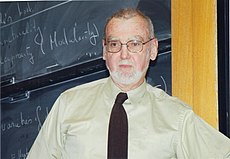Robert Langlands
| Robert Langlands | |
|---|---|
 |
|
| Born |
October 6, 1936 New Westminster, British Columbia, Canada |
| Nationality | Canadian |
| Fields | Mathematics |
| Institutions |
Princeton University, Yale University, Institute for Advanced Study |
| Alma mater |
University of British Columbia, Yale University |
| Doctoral advisor | Cassius Ionescu-Tulcea |
| Doctoral students |
James Arthur Thomas Callister Hales Baris Kendirli Jonathan Rogawski Diana Shelstad Rajat Tandon King-Fai Lai |
| Known for | Langlands program |
| Notable awards |
Jeffery–Williams Prize (1980) Cole Prize (1982) Wolf Prize (1995–96) Steele Prize (2005) Nemmers Prize (2006) Shaw Prize (2007) |
Robert Phelan Langlands (/ˈlæŋləndz/; born October 6, 1936) is a Canadian mathematician. He is best known as the founder of the Langlands program, a vast web of conjectures and results connecting representation theory and automorphic forms to the study of Galois groups in number theory. He is an emeritus professor and occupies Albert Einstein's office at the Institute for Advanced Study in Princeton.
Langlands received an undergraduate degree from the University of British Columbia in 1957, and continued on there to receive an M. Sc. in 1958. He then went to Yale University where he received a Ph.D. in 1960. His academic positions since then include the years 1960–67 at Princeton University, ending up as Associate Professor, and the years 1967–72 at Yale University. He was a Miller Research Fellow at the University of California Berkeley from 1964-65. He was appointed Hermann Weyl Professor at the Institute for Advanced Study in 1972, becoming Professor Emeritus in January 2007.
His Ph.D. thesis was on the analytical theory of semigroups, but he soon moved into representation theory, adapting the methods of Harish-Chandra to the theory of automorphic forms. His first accomplishment in this field was a formula for the dimension of certain spaces of automorphic forms, in which particular types of Harish-Chandra's discrete series appeared.
...
Wikipedia
